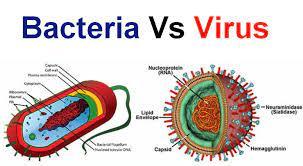
Viruses & Bacterial Infections
Viruses and bacteria are both types of microorganisms that can make you sick, but they work in different ways.
Viruses are incredibly small, much smaller than bacteria. They cannot live or grow on their own. Instead, they need to enter a living cell, like one of your body's cells, to reproduce. When they do this, they take over the cell's machinery to make copies of themselves, which can damage the cell and cause illness. Examples of viral infections include the common cold, flu, and COVID-19.
Bacteria, on the other hand, are single-celled organisms that can grow and reproduce on their own. Some bacteria are harmless or even helpful, but others can cause infections. They can release toxins or invade your body's tissues, leading to illness. Examples of bacterial infections include strep throat, urinary tract infections, and bacterial pneumonia.
Treatment
Viral Infections: Since viruses are much smaller and reproduce inside your cells, they're harder to target with medications. Most viral infections, like the flu or the common cold, don't have specific antiviral drugs. The body's immune system usually fights off viral infections over time. Treatment involves getting plenty of rest, staying hydrated, and managing symptoms with over-the-counter medications.
Bacterial infections: Bacterial infections can often be treated with antibiotics, which are medicines that kill or slow down the growth of bacteria. It's important to take the full course of antibiotics prescribed by your doctor, even if you start feeling better, to ensure that all the bacteria are eliminated. However, antibiotics don't work against viruses, so they won't help with viral infections.
If you're feeling unwell, it's best to consult a healthcare professional. They can properly diagnose the type of infection you have and recommend the appropriate treatment.
This guide is not a substitute for professional medical advice. Always consult a healthcare professional for accurate diagnosis and treatment or any other medical concern.
In an emergency, please call 911 immediately!
